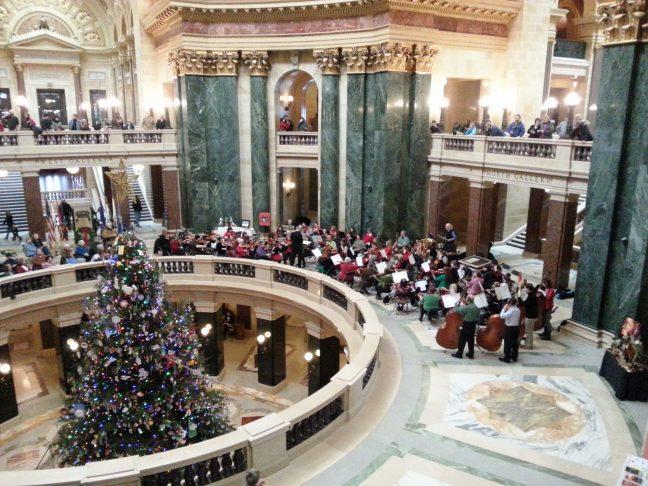In recent years, many have declared a “War on Christmas.” When Starbucks announced it would be abandoning its previous Christmas cup designs for a plain red cup in 2015, it sparked major controversy among Christians like Joshua Feuerstein, who claimed Starbucks “removed Christmas from their cups because they hate Jesus.”
More recently, Gov. Tony Evers decided to name the large evergreen in the center of Wisconsin State Capitol the “Capitol Holiday Tree.” This sparked controversy among multiple Republican lawmakers, ultimately leading to the passing of a resolution in the State Assembly to rename the tree a Christmas tree.
Assembly Majority Leader Rep. Jim Steineke, R-Kaukauna, claimed Gov. Evers was “playing politics” by deciding to call the tree a holiday tree, and said that doing so would be like calling the Menorah inside the Capitol a “holiday candelabra.”
This claim, however, is invalid. The tree controversy and overall “War on Christmas” is not only blown out of proportion, but it completely discounts the reality of the Christian-dominated world we live in here in the U.S.
Every year, thousands of schools and businesses across the country shut down for Easter, Christmas Eve and Christmas Day. Furthermore, the pervasiveness of Christmas in American culture is undeniably intense. Many department stores start decorating for Christmas before Halloween, and companies such as Hallmark center their entire marketing strategy in November and December around Christmas.
According to their website, the Hallmark Channel plays Christmas movies 24/7 during the holiday season. They are also premiering 24 new movies for the 10th anniversary of their “Countdown to Christmas” this year — only six of which do not include the word Christmas in their title.
But there are many other holidays Americans celebrate every year which fail to gain recognition. Hanukkah, celebrated by the Jewish people, lasts eight nights as it commemorates the story of the “Hanukkah Miracle.” According to the Torah, in the rededication of the Second Temple in Jerusalem, the flames of a menorah continued burning for eight nights despite only having enough oil to burn for one — therefore the festival lasts eight nights.
Amid divisions, disparities, students work to facilitate interfaith dialogues on campus
Diwali, also known as the Festival of Lights, is a holiday celebrated in October or November by Hindus, and uses the lighting of clay lamps to represent the destruction of any negative things in people’s lives.
These are just two examples of the variety of holidays that take place during the holiday season besides Christmas. The people of these religions have learned to adapt to all of the Christian-centered aspects of America, therefore, asking for just a little bit more inclusivity, whether it be in terminology or on Starbucks cups, is not asking for much.
As someone who is Jewish, I have learned how to adapt to living in a Christian-dominant world, and I no longer let small things such as the use of the term “Christmas” rather than “holiday” bother me. But claims of a “War on Christmas” are simply ridiculous to me, because it shows the ignorance of privilege that many Christians have regarding their religion.
Excluding Jewish holidays from legislative calendar disrespects Wisconsin’s Jewish community
Can Christians even imagine what it would be like to go to work or school on a Christian holiday? Because that is what people of different religions have to do every single year. Otherwise, they must take off of school or work and face the consequences for doing so.
I’m not saying that people can’t enjoy Christmas. In fact, though I do not observe the actual holiday, I genuinely enjoy the Christmas season — I love sipping on peppermint mochas and watching Christmas movies just as much as the next person.
But I think that we as a society need to be more cognizant of the fact that not everyone celebrates Christmas, and it’s not an “attack on Christians” to use the term “holiday” rather than “Christmas.” The next time you want to wish someone a “merry Christmas,” consider wishing them a “happy holidays” instead, because even small acts such as these show the consideration and respect of other religions.
Courtney Degen ([email protected]) is a junior studying political science and journalism.














